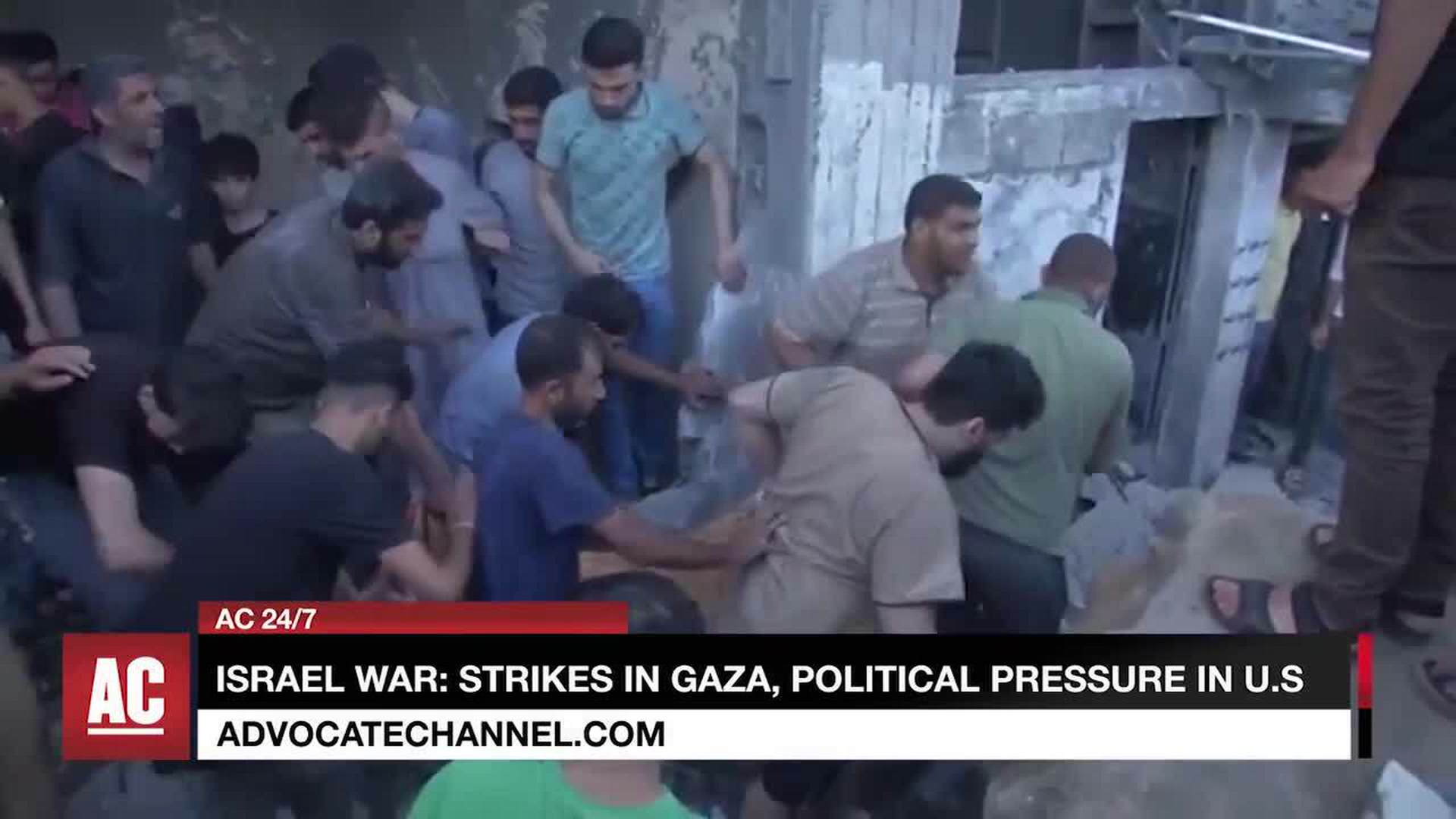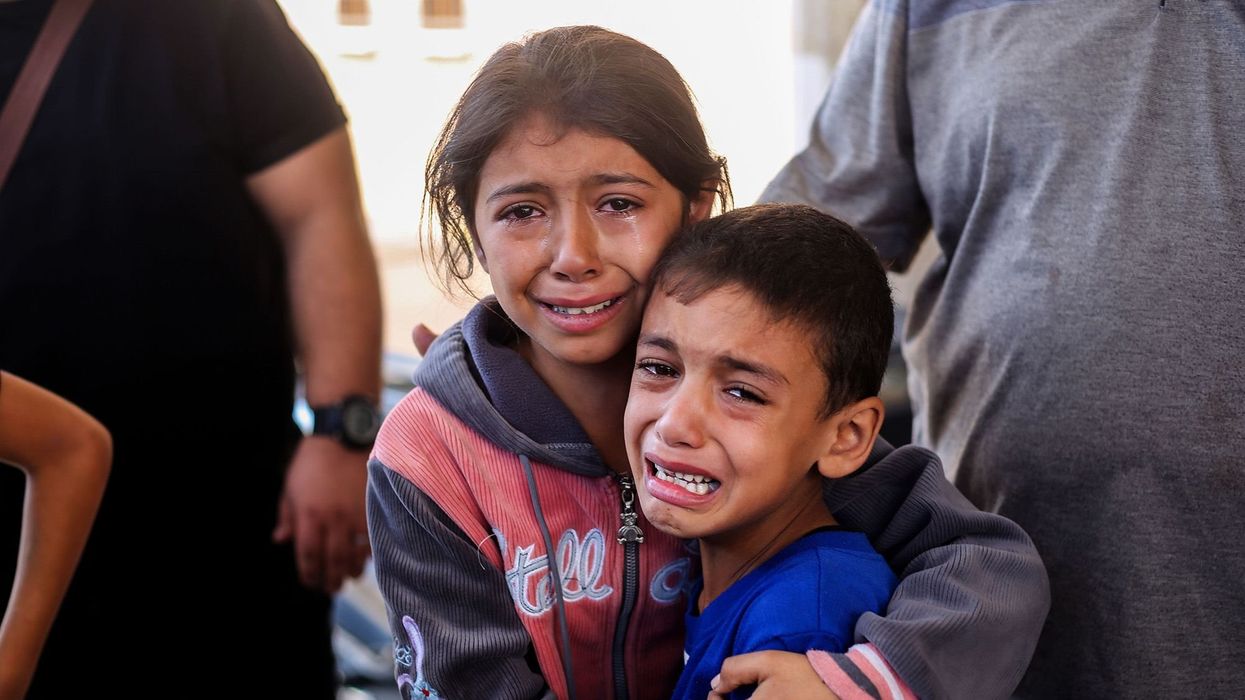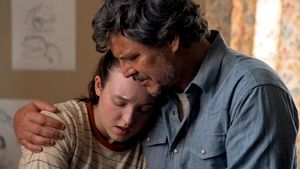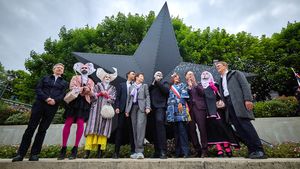
Video Source: Advocate Channel
Editor's note: A version of this story appears in CNN’s Meanwhile in the Middle East newsletter, a three-times-a-week look inside the region’s biggest stories. Sign up here.
(CNN) — Rajaa Musleh, 50, has been sheltering at Al-Shifa hospital, Gaza’s largest medical facility, which has been inundated not just by patients, but also displaced people desperately hoping that it might provide some protection from Israel’s brutal aerial campaign.
The Gaza representative for US-based healthcare NGO MedGlobal fled her home on the strip’s northern coast to Al-Shifa after the Israeli military declared war against Hamas in response to their deadly October 7 terror attack and called on civilians to evacuate the area in preparation for a ground operation.
More than 1.4 million people have been internally displaced in Gaza, the UN’s humanitarian office OCHA said on Monday. Many civilians have been forced to flee to refugee camps or hospitals that have surpassed capacity, often living in unsanitary living conditions.
The Al-Shifa hospital complex, she said, is overflowing with people, many of them women and girls sleeping on the floors of the hospital and outside, without access to physical or mental health care, water or privacy.
“Women are scattered all over the streets, all over the hospitals,” Musleh said. “I, personally, can’t go to the bathroom more than twice a day… amid the crowding.”
“Some are lucky if they can get a chance to use a bathroom with some 40, 50 or 60 people needing to use it.”
Musleh is one of hundreds of thousands of women in Gaza facing a desperate health crisis, since Israel’s complete blockade of the strip curtailed critical reproductive supplies, including pregnancy, postpartum and menstruation products, as well as basic necessities like drinking water and food. Meanwhile, mothers say they are dealing with the desperate reality that they have no way to protect themselves, or their children, from Israel’s relentless bombardment, which has struck residential areas, hospitals and schools.
Israel’s airstrikes have killed over 10,000 people, according to figures released by the Palestinian Ministry of Health in Ramallah, drawn from sources in the Hamas-controlled enclave. The vast majority of fatalities – 73 percent – are women, children and the elderly, according to the health ministry.
Human rights groups say Israel’s mass bombardment of civilian areas, evacuation orders and complete blockade of the territory amount to war crimes. Israel has said it is targeting Hamas operatives in Gaza, adding that the militant group “intentionally embeds its assets in civilian areas” and uses civilians as human shields.
Shortages push women and hospitals treating them to the brink
Reham Ahmed Al-Sadi had dreamed of having a baby girl. Now, nine months pregnant with her second child, she is preparing to give birth in a war zone, while trying to keep her family alive.
In messages relayed to CNN by the Palestinian Medical Relief Society, the 28-year-old said she was terrified by all aspects of delivering a child amid the raging conflict: “From preparing the baby’s supplies and postpartum supplies, getting to the hospital during labor, and leaving the hospital safely after giving birth.”
“The war destroyed my joy about my pregnancy,” she added.
Dr Tanya Haj-Hassan, a pediatric intensive care doctor working with Médecins Sans Frontières (MSF), also known as Doctors Without Borders, said rampant water, food and drug shortages have unleashed an “avalanche of human suffering” in Gazan hospitals.
Medical staff in the strip are running out of essential supplies including gauze for wound care and external fixators, which are pins and rods needed for orthopedic surgery, she told CNN. They have been forced to treat wounded survivors without anesthesia or painkillers.
Rafah, the sole border crossing between Gaza and Egypt through which Palestinians or aid can pass in and out remained shut for the first few weeks of the war. It was partially opened recently to allow a small number of aid trucks to trickle through – as well as a limited number of injured Palestinians and foreign nationals out.
Without essential fuel supplies, and the bombardment ongoing, nearly half of hospitals are now out of service, the Palestinian health ministry said on Wednesday.
In times of severe stress, women are more likely to miscarry or give birth prematurely, jeopardizing “the survival of the baby,” Haj-Hassan said. Diminished electricity supplies are a “death sentence” for patients who rely on medical equipment such as ventilators, or dialysis machines.
Premature babies require incubators, breathing machines, and infusion pumps for recovery, all of which depend on electricity, she added. “Without any of those things, those premature babies won’t survive.”
On Monday, the humanitarian agency CARE International reported pregnant patients are being forced to undergo emergency C-sections without anesthetics. Women are being discharged within as little as three hours after giving birth due to a lack of capacity in hospitals, according to CARE.
Food shortages pose a threat to the health of the 283,000 children under the age of five as well as pregnant or lactating women, said Hiba Tibi, CARE West Bank and Gaza country director.
Haj-Hassan said some of her colleagues in Gaza only have access to 33 milliliters (about 1.12 oz) of drinking water per day – a fraction of a cup – warning that thinning water supplies hamper mothers’ abilities to breastfeed their babies or feed them formula.
Amal, who was displaced from her home in Gaza City to Khan Younis in the south of the strip, is nine months pregnant and nervously awaiting what her birth might look like.
“What if I need a C-section? How will I give birth? There are no generators at the hospital. What if the remaining power goes off? What’s more dangerous than this is that there is no anesthetic. There is no healthcare at hospitals. There is no sanitation,” Amal, who asked that CNN not use her real name due to security concerns, said.
Her next pressing concern: how to care for her child. Limited water stocks must be boiled over wood or old gas to become drinkable.
“You’re lucky if you get a bucket filled with water,” Amal said. “[Mothers] are giving their babies adult milk. They boil it. Or , they crush some biscuits and add water to it, then stir them together. That’s a meal.”
Haj-Hassan said there is an outbreak of diarrheal disease, and respiratory tract infections including pneumonia, because people are sheltering in close living quarters.
Eman Bashir, 32, said most of the children she knows, including her own, “are suffering from diarrhea and vomiting.” The mother of three is in Khan Younis too, having been displaced from the north after the Israeli army’s evacuation order.
She added that she had heard of some women giving birth in schools because “most hospitals are not operational.”
Lack of reproductive supplies poses ripple effects
From sexual health to menstruation, the conflict is impacting all aspects of women’s health.
Contraceptive products are in short supply, the International Planned Parenthood Federation (IPPF) reported on Monday. One of the consequences of unmet need for contraceptive supplies is unintended pregnancies, Heather Barr, associate director of the women’s rights division at Human Rights Watch (HRW), told CNN.
Barr warned that in crisis situations, rates of sexual violence are likely to increase “because there is a feeling of impunity.”
“Women need sanitary products, they need sanitary towels, they need painkillers. Women are in great pain, they sleep on the floors, without mattresses,” Bashir, the 32-year-old mother, told CNN.
“Most pharmacies have stopped working,” Bashir added. “Even the pills (used by women to stop their periods) are no longer enough.
“We have started regressing to the old ages, where women use pieces of cloth (during periods). Women cannot avoid facing their monthly periods in this situation.”
Amal, the resident who was displaced to Khan Younis, said she has heard of many women using birth control pills to either stop or reduce the blood flow during menstruation. Those who do not, she said, use “old methods, clothes that are washed.”
Displaced women are likely to be in camps where a lack of clean and safe toilets, and reduced access to running water and privacy could lead to a spread in infections, including thrush, hepatitis B, and toxic shock syndrome, multiple relief workers told CNN.
Nesma ElFar, the commercial director of MotherBeing, said that the Cairo-based health platform is working with the NGO Together For Tomorrow, to send more than 400,000 donations of sanitary products, including pads, reusable panties, wipes and diapers, to civilians in Gaza.
She told CNN she received confirmation the products reached the Rafah crossing, but does not know when the aid will enter Gaza.
‘Under fire, under death, under ethnic cleansing, under injustice’
Palestinian mothers are balancing their own health care needs with caregiving responsibilities for their children, many of whom are affected by the psychological trauma of war.
Israel’s bombardment has separated families and increased the fear of dying among children, Haj-Hassan said. She told CNN that one of her colleagues in Gaza relayed a story about a girl who ran in front of a car, about two weeks ago.
“When asked why, [the child] said, ‘I just want to die. I can’t deal with the fear of dying anymore,’” Haj-Hassan added. She said medical workers use the term “wounded child no surviving family,” to describe children in Gaza who have been orphaned by war.
So many aspects of motherhood, once routine, are now a matter of life or death.
“Every day, a sister and mother, a woman loses her husband, her father, her brother. These are the women of Palestine. These are the women of Gaza,” said Musleh, the 50-year-old woman sheltering in Al-Shifa.
“We are under fire, under death, under ethnic cleansing, under injustice – under the injustice of the world, which sees with its eyes what is happening and is silent.”
The-CNN-Wire
™ & © 2023 Cable News Network, Inc., a Warner Bros. Discovery Company. All rights reserved.
- UN Sounds Alarm on 'Risk of Genocide' Against Palestinians ›
- Here Are Ways You Can Help Palestinian Civilians That Aren't Just Donating ›
- Gaza Has Become a 'Graveyard' For Children, 'Living Hell For Everyone Else:' UN ›
- Queering the Map in Gaza: LGBTQ+ Palestinians Pay Tribute to Deceased Loved Ones ›
- Henry Kissinger: Not a Legacy Worth Celebrating ›


















































